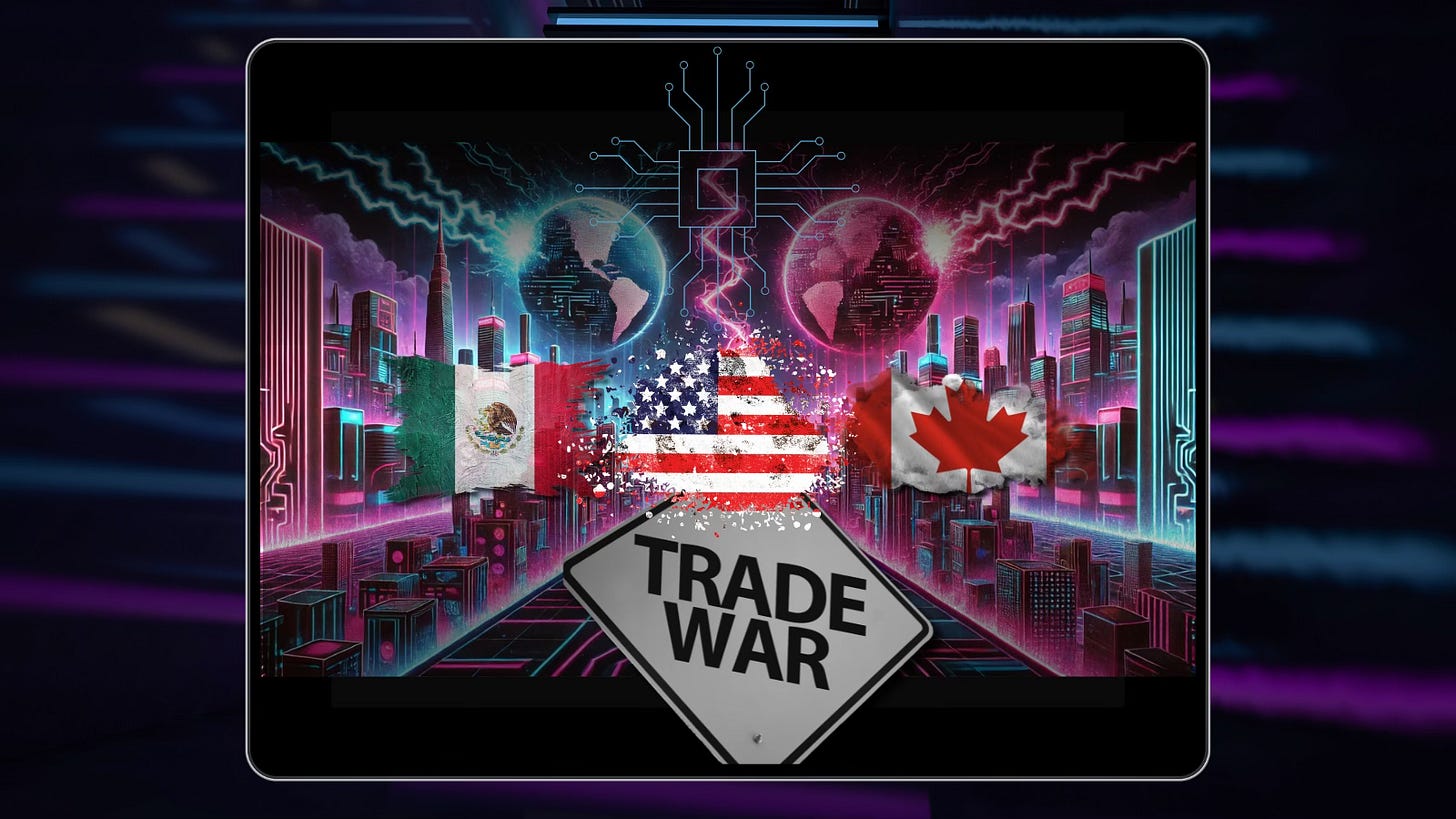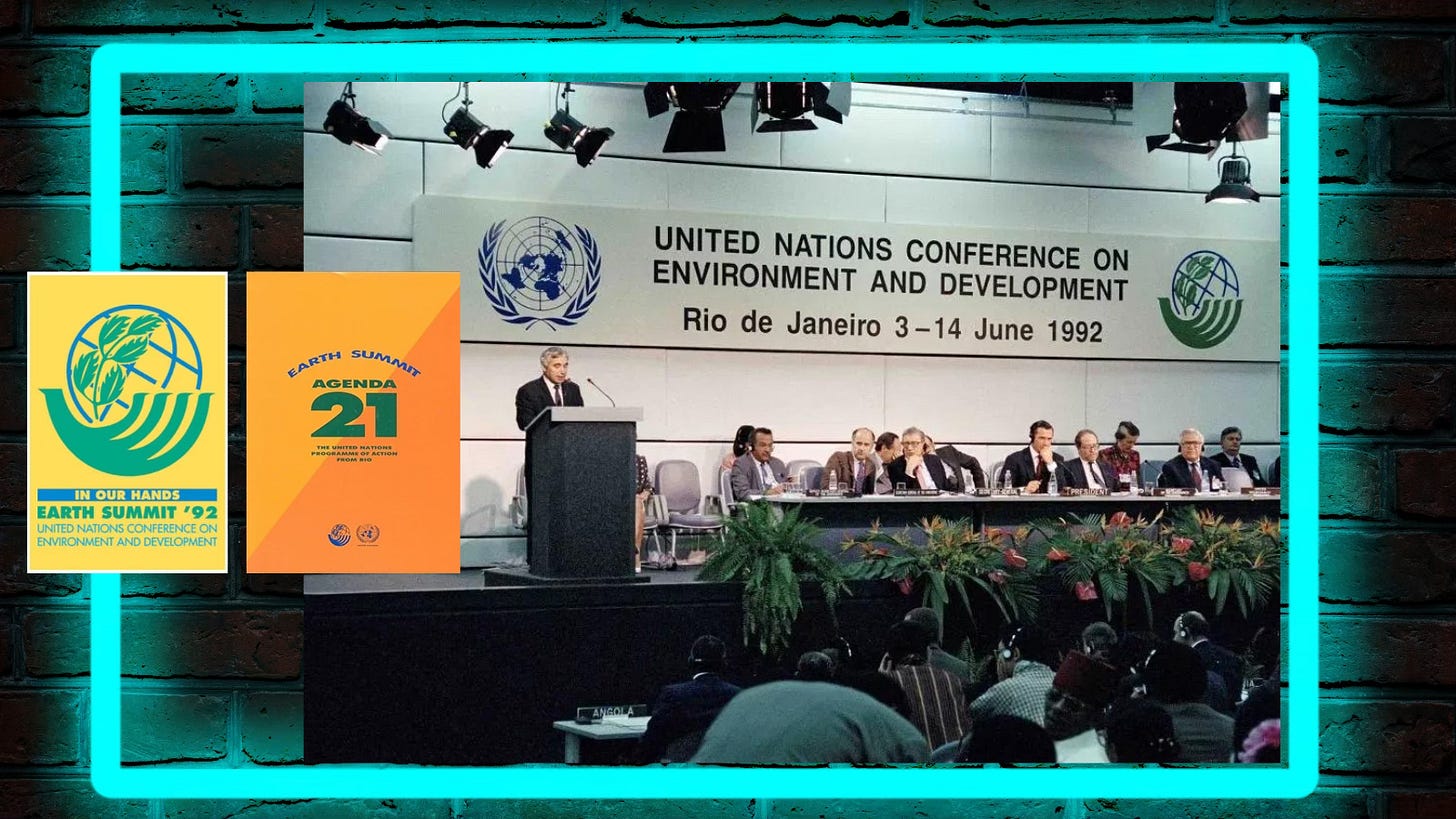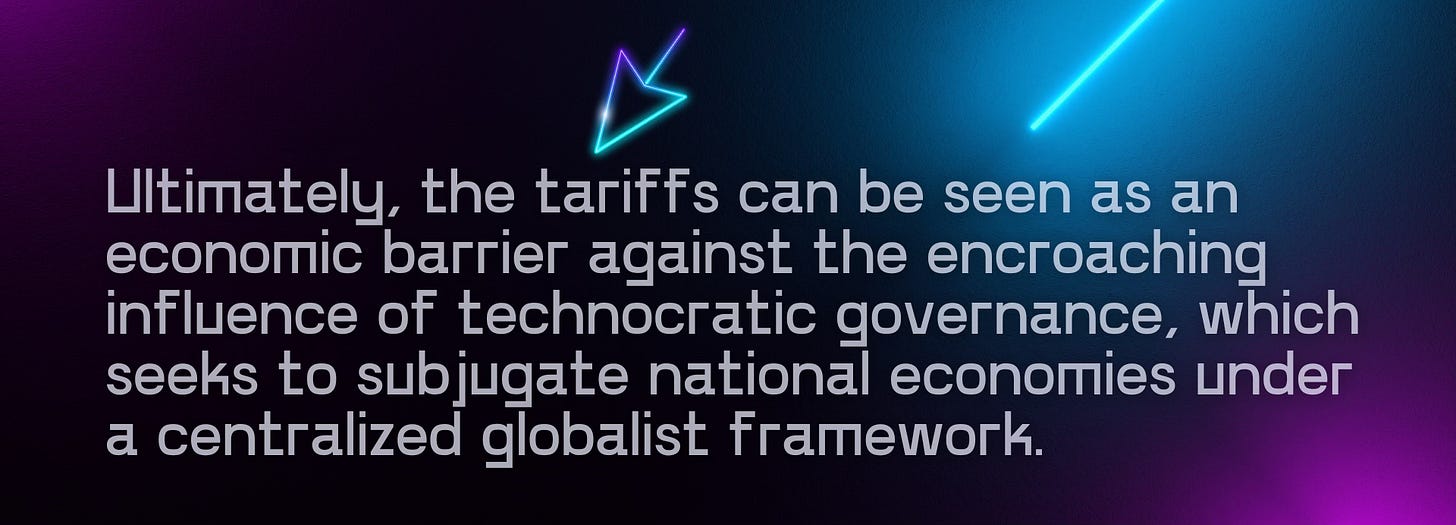Trump's tariffs on Canada and Mexico directly challenge the globalist framework outlined in Agenda 21. These globalist plans emphasize regional economic integration, environmental regulations, and the erosion of national sovereignty under the guise of sustainable development.
Seen & Heard
Canada and Mexico: Trump's 25% across-the-board tariffs on its US neighbors go into effect on Tuesday, March 4, after the president ruled out another delay to implementation. Canada retaliated with a package of tariffs on $107 billion of US products, some immediate. Mexico's president said it would announce retaliatory tariffs beginning on Sunday. —YahooFinance
What’s Happening - Mexico
President Donald Trump's decision to impose 25% tariffs on Mexican imports was officially justified by concerns over illegal immigration, drug trafficking—particularly fentanyl—and trade imbalances. The administration aimed to pressure Mexico into taking more stringent actions to curb these issues, thereby enhancing U.S. national security and encouraging domestic manufacturing by making foreign goods more expensive. Source:AP
How the Tariffs Undermine Globalist Objectives
Disrupting Economic Interdependence Globalists push for regional integration (such as NAFTA/USMCA) to make nations economically dependent on each other. By imposing tariffs, the U.S. reasserts control over trade, countering the WEF’s vision of a borderless economic order.
Challenging the Climate-Control Narrative Canada and Mexico, heavily invested in the green economy and carbon regulations, are key players in the Net Zero agenda. Tariffs on industries affected by these regulations undermine carbon credit schemes and ESG mandates.
Weakening the Globalist Trade Bloc Strategy The UN and WEF favor regional trade blocs that override national laws. By shaking up NAFTA/USMCA trade, Trump disrupts the mechanism used to bind nations into supranational agreements. (see USMCA explained below)
Forcing Domestic Production & Economic Nationalism Globalist trade policies offshore manufacturing and agriculture, making nations dependent on foreign supply chains. Tariffs incentivize domestic production, reducing reliance on globalist-controlled markets.
Exposing the Myth of “Free Trade” Globalists sell “free trade” as beneficial, but it’s often a tool for corporate monopolies and economic manipulation. Tariffs reveal the hypocrisy of trade deals that benefit multinational elites at the expense of national industries.
The Bigger Picture
Trump’s move aligns with a broader strategy to reclaim economic sovereignty, which is the greatest threat to the globalist vision. If the U.S. re-industrializes and secures its supply chains, the controlled demolition of Western economies under the guise of climate action and wealth redistribution becomes much harder to enforce.
In short, these tariffs are more than just trade policy—they’re a strategic blow to the WEF’s Great Reset model, which depends on breaking down national economic autonomy.
Can Trump's tariffs serve as an effective countermeasure against the globalist agenda?
This article will explore the exercise of economic warfare.
The USMCA (United States-Mexico-Canada Agreement) is the trade deal that replaced NAFTA (North American Free Trade Agreement) in 2020. It was negotiated under the Trump administration as a modernized version of NAFTA, with adjustments aimed at protecting American jobs, strengthening labor laws, and addressing trade imbalances.
Why This Matters in the Context of Globalism
USMCA attempted to curb NAFTA’s damage, which had hollowed out U.S. manufacturing and outsourced jobs to Mexico. While it kept regional economic integration, it introduced more sovereignty-friendly provisions, such as periodic reviews. Globalists favor NAFTA-style trade deals because they lock nations into permanent economic interdependence—removing the ability to pivot toward economic nationalism.
Trump’s current tariff war with Canada and Mexico suggests that USMCA isn’t strong enough to fully protect U.S. economic sovereignty, and further action is needed to counter globalist trade strategies.
Canada’s Capture by Global Collectivism & Technocratic Control
Donald Trump's tariffs on Canada, particularly the tariffs on steel and aluminum under Section 232 (2018), were publicly justified as a measure to protect U.S. national security and domestic industries. However, when viewed through the lens of global collectivism and technocratic control, a deeper strategic rationale emerges.
Justin Trudeau is a graduate of the World Economic Forum's (WEF) Young Global Leaders program and a staunch advocate of the United Nations’ 2030 Agenda and its 17 Sustainable Development Goals (SDGs). His administration has consistently pushed policies aligned with the globalist agenda, including:
Climate mandates that restrict industry through carbon taxes and “green” energy transitions.
Censorship laws under the guise of “online safety” to control narratives.
COVID-era authoritarian measures, including travel bans and vaccine mandates.
Push for Digital IDs and Central Bank Digital Currencies (CBDCs)—steps toward technocratic social control.
Trump’s Tariffs as Economic Warfare Against Globalist Control
Trump’s tariffs on Canadian steel and aluminum can be speculated as a countermeasure against Canada’s role as a compliant node in the globalist system. If Canada is being used as a conduit for technocratic supply chain controls—such as carbon-regulated trade and globalist manufacturing dependencies—the tariffs serve to:
Undermine WEF-aligned economic influence – Canada’s deep entrenchment in the WEF and UN sustainability mandates means its industries are vassals of the global economic restructuring rather than free-market participants. Tariffs will limit the economic interdependence that globalists use to erode national sovereignty.
Disrupt the “Green Transition” chokehold – By hitting Canada’s aluminum and steel industries, the tariffs can be a preemptive strike against ESG-driven supply chain control, which seek to limit Western manufacturing through climate regulations and reliance on foreign production.
Expose Canada’s compromised sovereignty – Canada operates less like a sovereign nation and more like a managerial state within the globalist system. The tariffs force Canada to either negotiate in national interest or expose its allegiance to supranational governance bodies like the UN and WEF.
Tariffs as a Check on Globalist Trade Structures
While the public rationale for Trump’s tariffs on Canada is framed around economic fairness and national security, the broader context suggests they are also a strategic move against the globalist technocratic agenda. Canada, under Trudeau’s leadership, has willingly surrendered its economic and governance policies to global collectivist institutions, positioning itself as a tool for the Great Reset agenda.
By imposing tariffs, Trump can seek to:
Reduce U.S. economic entanglement with a captured state. Force Canada to reassess its alignment with WEF policies. Reinforce U.S. manufacturing independence against the globalist push for controlled supply chains.
Ultimately, the tariffs can be seen as an economic barrier against the encroaching influence of technocratic governance, which seeks to subjugate national economies under a centralized globalist framework.
By imposing trade barriers on key industries like steel, aluminum, and manufacturing, Trump disrupts the global supply chain mechanisms that organizations like the UN, WEF, and WTO use to enforce climate mandates, carbon restrictions, and trade dependencies under the guise of “sustainability.”
Trump’s tariffs force these nations to reassess their economic reliance on globalist trade structures while reinforcing American industrial independence, a direct challenge to the Agenda 21 blueprint for economic centralization and managed decline of Western industry.
In targeting Mexico, a nation that’s shifted towards collectivist governance— and Canada, deeply embedded in WEF-aligned technocracy, Trump’s tariffs slow the Great Reset’s economic restructuring and provide a nationalist pushback against the erosion of self-sustaining economies.
While not a complete dismantling of Agenda 21, these tariffs are a roadblock to the globalist agenda, proving that national economies can resist the forces of supranational control.
Thank you for reading!
Please kindly help us get this msg out.
Summer Black, Director, Armor of Truth
Faith is Resistance!
About Armor of Truth: https://armoroftruth.substack.com/about
Download the Armor of Truth Mobile App Free
NEW! AoT Locals
NEW! AoT Telegram
Armor of Truth, Inc is a 501(c)(3) Non Profit Organization
Donations are tax deductible
By supporting Armor of Truth you are helping to reach thousands of people daily with the Gospel of Jesus Christ and encouragement to persevere in a world that is hostile to the gospel. Please consider making a donation to help support this mission.
Support Armor of Truth, official donation page: Donate











